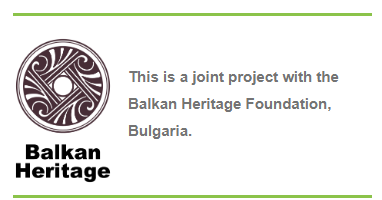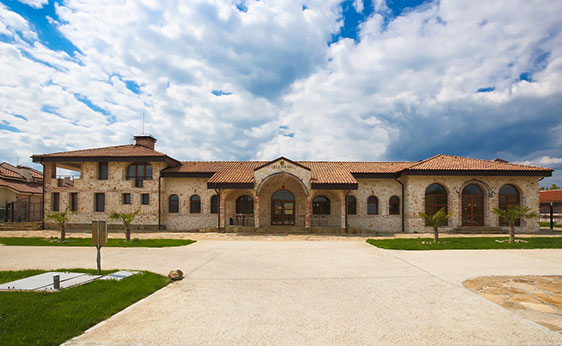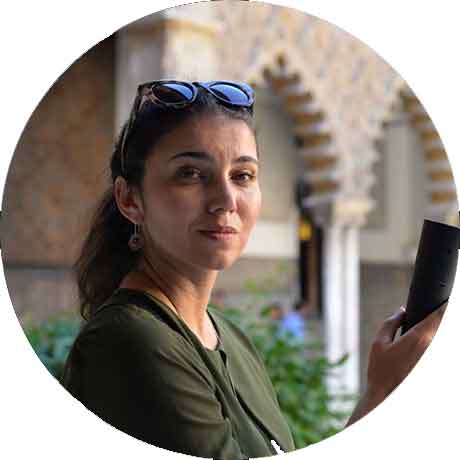Project Description

Overview
The ruins of an ancient site in the heart of Thrace – on the left bank of Maritsa River (ancient Hebros) – were discovered in 1988. In 1990, a stone inscription was found which helped scholars identify the site as the Ancient Greek trade center (emporion) named Pistiros. Between the 5th and 3rd century BCE, merchants from the Greek coastal cities of Maroneia, Thassos and Apollonia lived and traded here with their Thracian neighbors under the supreme protection of the Thracian Odrysian kings.
To date, field school students have worked in a sector next to the fortification wall where two chronologically different building horizons were identified. In the earlier one, the area was covered with simple, half dug in houses, presumably dated to the very first period of the site’s existence – the end of the 5th century BCE. The architectural remains from the second horizon, belonging to buildings made of wooden beams and wattle & daub, existed in the period between the second half of 4th and beginning of the 3rd century BCE. A huge amount of local and imported Greek vessels, cult figurines, Greek and Thracian coins, and weapons were among the discovered artifacts. Training in Reflectance Transformation Imaging (RTI) of small finds will supplement the excavation program.
| Course Details | |
|---|---|
| Course Dates | July 21-August 18, 2024 |
| Course Type | Field Archaeology, Classical, Hellenistic |
| Instructors | Dr. Angela Pencheva, Dr. Alexey Gotsev & Dr. Emil Nankov |
| Credits* | 8 semester (12 quarter) |
| Apply By | April 15 |
| Fees Due By | Summer 2 (May 15) |
| Program Fees | |
|---|---|
| Tuition | $3,875 |
| Transcript Fee* | $300 |
| Health & Evacuation Insurance | $125 |
| Room & Board | $2,200 |
| TOTAL: | $6,500 |
Applications accepted on a rolling basis until program fills or final deadline above.
Instructors
The directors welcome emails and inquiries about the research elements of this project. More general information (tuition, health insurance, and payment schedule) can be found under the ‘Students’ tab above. Any further questions may be addressed to IFR staff. Additional details about research, course schedule, travel, accommodation, and safety can be found on the syllabus. Contacting the directors or the IFR office is encouraged and appreciated. It may help you determine if this field school is a good fit for you.
Testimonials
This was my first field school and I absolutely loved it! It totally confirmed that I wanted to study Archaeology and that this is what I want to do professionally. Pistiros itself is a great site to work at, really interesting and I learned a lot that I didn’t know previously. We also got to work in an amazing pit – we found lots of pottery, bones, etc. Bulgaria is a very beautiful country with very hospitable people. It was an awesome experience which I wouldn’t be able to do if it weren’t for Balkan Heritage Field School, so thank you!
Emporion Pistiros –amazing site, amazing venue – the site itself has got to be one of the most interesting sites in Bulgaria and the sheer amount of artefacts we found and how varied and interesting they were– it was phenomenal! Altars, figurines, everything you could hope for, you can find in Pistiros. The hands-on experience that you get – everyday you’re learning a little bit more and you get better and precise with your own tool work. The supervisors did such a good job at teaching us and integrating us into the real work – at what you’ll have to do as an archaeologist. I can tell how much I’ve grown looking back in my journal in the 4 weeks of the project. It’s so much more that you can ever learn in a classroom.
Payment & Student Fees
Application Fee: There is a $45 fee to submit an online application.
Deposit Payment: A nonrefundable $500 deposit is due within 3 weeks of program acceptance in order to secure your place. The remainder of your program fees are due by the deadline indicated under “Course Details”.
*Transcript Fee & Academic Credit Opt Out: If you wish to participate in an IFR field school without earning academic credits, you will not be charged a transcript fee.
For more information about payment, fees, and policies, please see details under our Payment & Finances and Withdrawal and Cancellation Policy pages.
Accommodations
Accommodation will be in the Villa Terres Hotel at Karabunar, in comfortable rooms with 2-3 beds, bathrooms with a shower, air-conditioning,and TV. The hotel has a small swimming pool and SPA, free of charge for the participants in the field school. Cheap laundry service and free Wi-Fi are provided.
Karabunar is a small village: there are a couple of food & beverage shops, bars & taverns, a winery, and a Christian Orthodox church, St. John the Baptist. The closest supermarket, pharmacy, bank with ATM, and medical office are in the municipal town of Septemvri, 8km away from Karabunar.
The distance from the hotel to the site is app. 15 km/9.5 mi, and it takes an app. 15/20 min drive. Daily BHF shuttle service is arranged for the participants to bring them to the site and back. The site has electricity, there are portable toilets and running water.
Meals
Three meals (fresh, organic Bulgarian homemade food) per day are covered by the reimbursement payment. Meals usually take place in the hotel’s restaurant, except lunch packages during excursions. This field school can accommodate vegetarians, vegans, and individuals with lactose-intolerance. Kosher and gluten-free diets are impossible to accommodate in this location.


Travel Info
Natural disasters, political changes, weather conditions and various other factors may force the cancellation or alteration of a field school. IFR recommends students only purchase airline tickets that are fully refundable and consider travel insurance in case a program or travel plans must change for any reason.
General information for this program is below, but keep in mind we will discuss any updated travel information and regulations during the required program orientation, which could affect travel plans.
All students will be picked up from the Sofia airport with an organized shuttle and delivered to the project hotel Villa Velis in the village of Karabunar the next day. The project cost does not cover the shuttle price. Once at the project venue, students and project staff will travel to and from the excavation site daily by shuttle (short 15 minute ride in each direction) that affords reasonable spacing of occupants.
VISA REQUIREMENTS
Citizens of EU, EEA, USA, Canada, Japan, Republic of Korea, Australia and New Zealand do not need a visa to visit Bulgaria for up to 90 days. Citizens of all other countries may need a visa. The Balkan Heritage Foundation can send an official invitation letter that should be used at the relevant embassy to secure a visa to the program. For more information visit the Balkan Heritage Foundation web site at http://www.bhfieldschool.org/information/visa-help and the links provided there.
Citizens of other countries are asked to check the embassy website page at their home country for specific visa requirements.
Student Safety
The IFR primary concern is with education. Traveling and conducting field research involve risk. Students interested in participating in IFR programs must weigh whether the potential risk is worth the value of education provided. While risk is inherent in everything we do, we do not take risk lightly. The IFR engages in intensive review of each field school location prior to approval. Once a program is accepted, the IFR reviews each program annually to make sure it complies with all our standards and policies, including student safety.
Students attending IFR international programs are covered by a comprehensive Health Insurance policy that includes physical illness or injury, mental or chronic conditions. No deductible and 100% of costs are covered up to $250,000. In addition, we provide Political and Natural Disaster Evacuation policy, which allow us to remove students from field school location if local conditions change. Our field school directors are scholars that know field school locations and cultures well and are plugged in into local communities and state institution structures.
Students attending IFR domestic programs (within the US) must have their own health insurance and provide proof upon enrollment. IFR field school directors are familiar with local authorities and if in need of evacuation, local emergency services and/or law enforcement will be notified and activated.
The IFR has strong, explicit and robust policy towards discrimination and harassment in the field. If students feel they cannot discuss personal safety issues with field school staff, the IFR operates an emergency hotline where students may contact IFR personnel directly.
Call (877-839-4374) or email (info@ifrglobal.org) if you have questions about the safety of any particular program.



























